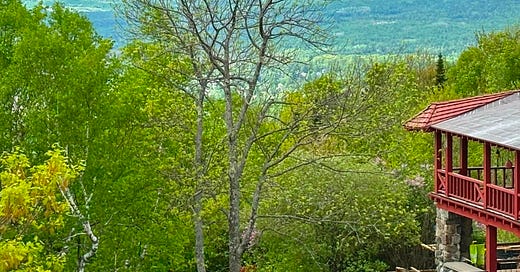Our posts are completely free to read. If you enjoy our work and wish to support our book, there's an option to upgrade to paid, but only if you want to. We are grateful to all our subscribers!
A few weeks ago, my husband and I visited his cousin in the mountains of Northern New Hampshire. Even though it wasn’t leaf season, I was mesmerized by the beauty of the trees, with their new growth and varying shades of green. This is an example of what I saw.
The backdrop of the hills and mountains calmed me. Connected to nature, it was easy to forget— for a few hours— the tensions of life. I came home invigorated and committed to trying to remember to soak myself in nature each day. And to find other ways to capture that energized feeling (keep reading to learn more).
This experience, referred to as Awe, is the topic of neuroscientist Dr. Melodie Winawer's TEDx talk. In The Neuroscience of Awe Experiences, Melodie describes multiple types of Awe, that get us “out of our head, and into the world.” Awe expands time, and gives us plenty of time to get everything done. Awe is also great for our physical and mental health! By calming the signals in our brains, Awe allows the body to “rest, recover, and repair itself.”
What else besides nature provokes Awe? Melodie reminds us that we can find Awe in our daily lives, multiple times a week, and in many places. One unexpected place that I’ve found Awe in my life is through my conversations with others who view the world differently than me. Journalist Amanda Ripley talks about ways to “complicate the narrative”, including letting go of our tightly held beliefs and listening deeply to others.
My friend Catherine and I started a discussion group in Nashville in 2023 called “Complicating the Narrative” based on the concept that introducing nuance into contentious issues was healthy. We made sure the group was balanced, including both conservative and liberal voices.
For example, we discussed topics like immigration, and realized that there were many different approaches to how people thought about the Southern border. However, we all valued a path to citizenship for people who had legally entered the country. We then complicated the narrative by discussing asylum seekers and where they fit in, and also how our country would pay for vetting processes. We came up with creative solutions such as having small businesses that benefited from hard-working immigrants help finance the vetting processes and paths to citizenship.
When we engaged people in conversations across differences, we often found agreement, but that wasn’t our goal. Our goal was to hear others, with genuine curiosity, and feel heard ourselves. Through this process, we became more empathetic and connected with others. As Melodie explains, in Awe, we forget “where we end and where the world begins.” The more I experience Awe from communicating across differences, the more conversations I want to have. Working through our local and national problems becomes achievable, even fun!
You will find more of these examples in our forthcoming book, “Beyond the Politics of Contempt”— Practical Steps to Build Positive Relationships in Divided Times. If you liked this post, please check out our other posts https://togethernow.substack.com/archive. All of our posts are available at no cost to subscribers.





